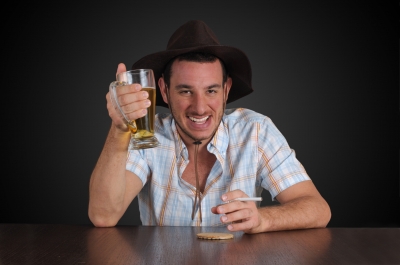Attractiveness is one of the most important signals of mate quality as it suggests the presence of good genes and good physical health. However, it is often claimed that drunken individuals perceive members of the opposite sex as being more attractive than they would when sober. This has resulted in a number of experiments being carried out to investigate the apparent shift in perception.
The Beer Goggles Effect
The beer goggles effect refers to the popular belief that an increase in alcohol consumption results in members of the opposite sex becoming more attractive. But is there any truth to the claim? Academics in Scotland set out to find evidence of this fascinating phenomenon.
The study was conducted by Professor Barry Jones from Glasgow University and involved a sample of 80 students. Half of the students had drunk up to four units of alcohol, an equivalent of a maximum of around two pints of lager or two and a half glasses of wine. The students were then shown color pictures of 120 male and female students from St Andrews University aged 18 to 26 years old and asked to rate the photos in aesthetic properties on a scale from (1) – highly unattractive to (7) – highly attractive.
[showmyads]The results showed that the 40 tipsy participants rated the people in the photographs as more attractive than their sober counterparts, with moderately drunk males and females finding faces of the opposite sex about 25% more alluring. There was negligible difference in the beer goggle effect between the two genders.
So it seems that alcohol can affect our perception of others, but does it affect the way we perceive ourselves?
To answer this question, Laurent Bèguea and her research team carried out a balanced placebo test with a sample of 86 Frenchmen. Half of the participants were given an alcoholic minty lemon drink, the equivalent of 5 to 6 shots of vodka. In that group, half of the participants were truthfully told that the drink was alcoholic while the other half was told that that the drink was a new and non-alcoholic beverage.
The remaining 43 participants drank alcohol free versions of the minty lemon drink. In this group, half were misled into thinking that the beverage was alcoholic (alcohol was sprayed on the glass to give it an alcoholic scent) and half were truthfully told that the drink was non-alcoholic. After allowing the alcohol sufficient time to take effect, the experimenters made them all record a commercial for the fictional company they had been told produced the drink. Right after the exercise, they watched the ad they had made, and rated their own attractiveness. The results showed that the participants who thought they were drunk rated themselves as more attractive, regardless of whether they had taken any alcohol or not.
Were the men who believed that they were intoxicated actually more physically attractive than their sober counterparts? The simple answer is no. This point was illustrated by a separate group of 22 students who also watched the commercials and evaluated the men in terms of their attractiveness.
According to lead researcher Laurent Beguea, it is not the chemical content of alcohol that makes persons think they are more attractive than they really are, but rather their implicit beliefs about alcoholic beverages. People tend to associate alcohol with attractiveness and it is the mere belief that they are drunk that inflates the self-perceived appeal. According to Professor Jones on the other hand, the beer goggles phenomenon is caused by alcohol stimulating the part of the human brain which is used to determine facial attractiveness, the nucleus accumbens.
Image courtesy of FreeDigitalPhotos.net



